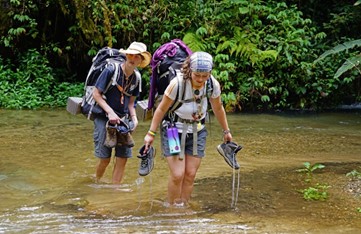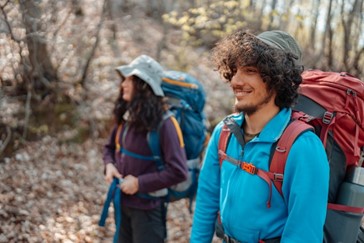Backpacking is an exhilarating way to explore the world, offering freedom, adventure, and an intimate connection with new places. It also presents a fantastic opportunity to travel economically. By focusing on the essentials and adopting a minimalist approach, backpackers can significantly reduce travel costs while still experiencing rich and fulfilling journeys. Angel Bernal Robles discusses below the economics of backpacking, offering detailed tips on how to travel light and cheap without compromising on the quality of your experience.
Planning and Preparation
Research and Itinerary
Before setting off on your backpacking adventure, thorough research is crucial. Understand your destination’s cost of living, popular travel routes, and available accommodations. Websites like Lonely Planet and forums such as Reddit’s r/backpacking can provide invaluable insights from experienced travelers.
Create a flexible itinerary that includes must-see destinations and off-the-beaten-path locations. Flexibility can help you take advantage of last-minute deals and avoid peak tourist prices.
Budgeting
Set a realistic budget that includes accommodation, food, transportation, activities, and a contingency fund for emergencies. Use apps like Trail Wallet or TravelSpend to track your expenses on the go. Allocating daily spending limits will help you manage your finances effectively.
Packing Light
The Essentials
Packing light is a cornerstone of economical backpacking. Focus on multi-functional clothing and gear that can serve multiple purposes. Here’s a basic packing list:
- Clothing: Lightweight, quick-drying clothes, a versatile jacket, and comfortable footwear.
- Travel Gear: A sturdy backpack, a compact sleeping bag, and a portable water filter.
- Toiletries: Minimalist toiletries in travel-sized containers.
- Technology: A smartphone, a power bank, and universal adapters.
- Documents: Passport, visas, travel insurance, and copies of important documents.
Remember, every item you pack should be necessary and preferably lightweight.
Tips for Packing Light
When preparing for your backpacking adventure, strategic packing can make a significant difference in comfort and convenience. Opt for layering instead of bulky clothing, allowing you to adjust to varying weather conditions effortlessly.
Pack lightweight, moisture-wicking base layers, versatile outerwear, and a waterproof jacket that can be easily added or removed as needed. Plan to do laundry on the go to keep your load light and fresh. Many hostels provide laundry services, or you can wash clothes in sinks using biodegradable soap for eco-friendly cleanliness. Choose dual-purpose items like a sarong, which can serve as a towel for the beach, a blanket for picnics, or a cover-up for modesty, maximizing utility without adding unnecessary weight to your pack.
Accommodation
Budget-Friendly Options
Accommodation can be one of the biggest expenses while traveling. Consider the following budget-friendly options:
Hostels: Offer dormitory-style rooms at a fraction of the cost of hotels. Websites like Hostelworld can help you find highly-rated, affordable hostels.
Guesthouses and Homestays: Provide a more personal experience often at a lower cost.
Couchsurfing: Stay with locals for free through platforms like Couchsurfing, which also allows you to experience the local culture firsthand.
Camping: If you’re an outdoor enthusiast, camping can be a cost-effective and scenic option. Research designated camping areas and regulations at your destination.
Long-Term Stays
For extended stays, consider renting an apartment or house through Airbnb or similar platforms. Negotiating a lower rate for longer stays can save you money and offer more comfort.
Transportation

Getting Around Cheaply
Transportation is another significant cost for backpackers. Here’s how to minimize it:
When navigating a new destination on a budget, consider leveraging public transport networks such as buses, trains, and metros instead of relying solely on taxis. Many cities offer convenient tourist passes that provide unlimited travel on these modes of transportation, making them cost-effective and efficient for sightseeing. For the adventurous traveler, hitchhiking can be a viable option to move between destinations at no cost, though it’s crucial to prioritize safety by researching local customs and laws beforehand. Additionally, exploring cities and towns on foot or by bike not only saves money but also offers a deeper, more immersive experience of the local culture and surroundings. Whether strolling through historic districts or pedaling along scenic routes, opting for biking and walking enhances your journey while keeping expenses in check.
Long-Distance Travel
Budget Airlines: Book flights with budget airlines and travel light to avoid additional baggage fees. Use fare comparison websites like Skyscanner to find the best deals.
Overnight Buses and Trains: Save on accommodation costs by traveling overnight. This can be a comfortable and efficient way to cover long distances.
Food and Drink
Eating on a Budget
Food can add up quickly, especially in tourist areas. Here are some tips for eating well without overspending:
Local Markets: Buy fresh produce and snacks from local markets. It’s cheaper and often of higher quality than supermarket goods.
Street Food: Enjoy authentic, affordable meals from street vendors. Research popular and safe street food options before indulging.
Cooking: If your accommodation has kitchen facilities, cook your meals. This is a great way to save money and try local ingredients.
Drinking Smart
Water: Carry a reusable water bottle with a filter to avoid buying bottled water.
Alcohol: Limit alcohol consumption or buy from stores instead of bars and restaurants, where prices are significantly higher.
Free and Low-Cost Activities
Exploring Without Spending
Many amazing experiences don’t require a hefty budget:
Hiking and Nature Trails: Explore the natural beauty of your destination through free or low-cost hiking trails.
Museums and Galleries: Take advantage of free entry days at museums and galleries.
Local Festivals: Participate in local festivals and cultural events, which often have no entry fee.
Volunteering
Consider volunteering in exchange for accommodation and meals. Programs like Workaway and WWOOF (World Wide Opportunities on Organic Farms) offer opportunities to work in diverse settings around the world.
Final Thoughts
The economics of backpacking hinge on traveling light, planning smart, and embracing a minimalist lifestyle. By prioritizing experiences over possessions and making thoughtful financial choices, you can enjoy rich, rewarding adventures without breaking the bank. Whether you’re exploring bustling cities or tranquil countryside, the principles of economical backpacking will help you make the most of your journey. Happy travels!
